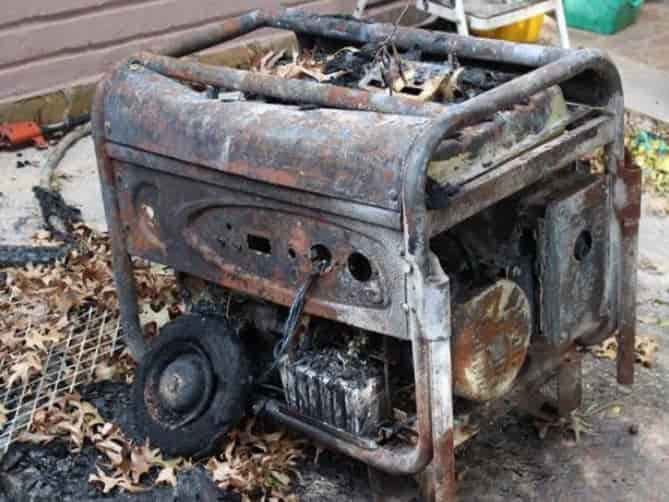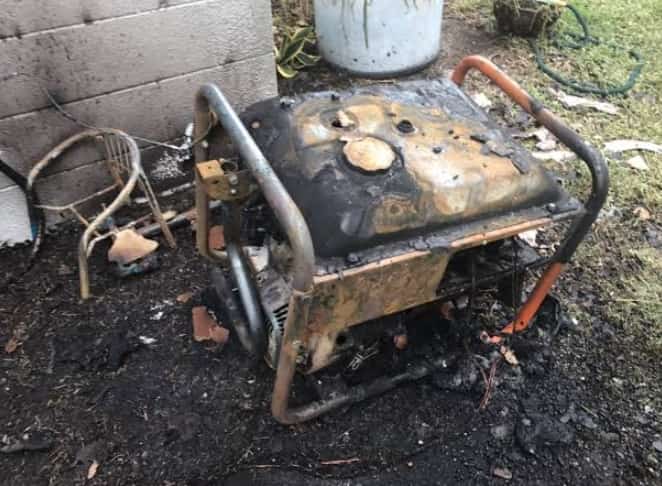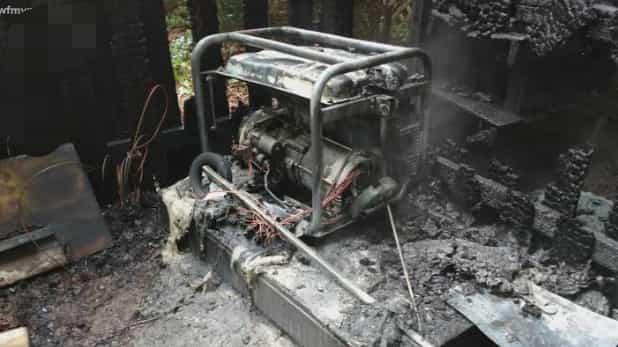As an Amazon Associate, we earn from qualifying purchases. This does not affect the price you pay or the quality of the products you buy. For more information, please read the full affiliate disclosure here.
If you own a generator, especially a diesel generator, you may have experienced overheating issues for a short period of time.
If you do not address the issue promptly as it emerges, it can cause permanent damage to your generator.
Therefore, understanding the common causes and solutions for why the generator overheats can help you avoid downtime and repair costs.
One of the most common causes of generator overheating is poor ventilation. Generators require sufficient airflow to cool their engines.
That’s why it’s highly advised not to run it if the generator is placed in an enclosed space or has clogged air filters—it can overheat quickly.
Apart from poor ventilation, another common cause of generator overheating is overloading.
Let’s say if you try to power too many appliances or devices at once, the generator may not be able to handle the load, causing it to overheat.
Low oil pressure, clogged fuel filters, and worn or damaged belts can also cause generator overheating.
It is important to perform regular maintenance on your generator to ensure it is in good working condition.
So, in the next sections, we will discuss in detail these common causes of generator overheating and provide solutions to help you avoid this issue. Let’s get started!
Trouble with your generator? Get expert personalized troubleshooting tips tailored for you alone directly to your email. Contact us now for reliable support and practical solutions. Let’s fix it together – reach out today!
Why Do Generators Overheat?
Generator overheating is a common problem, especially in diesel engine generators, as explained earlier, because of their cooling systems.
And if it’s not fixed immediately, it can lead to significant damage and loss of performance.
But one way to prevent these issues is to carefully understand the causes, recognize the signs of generator overheating, and take appropriate measures to avoid the consequences of excessive heat.
Affiliate Ads

Home Generator: Selecting, Sizing And Connecting: The Complete Guide
Discover a must-read guide for all things generators! This book is a goldmine of expert advice and clear explanations. Uncover how generators work, their types, and real-world uses effortlessly. Whether you’re prepping for emergencies or intrigued by this tech, this book has you covered. Don’t miss out on enhancing your generator knowledge!
As a general thumb rule for all engines, not only generators, several factors can cause overheating, including high ambient temperatures, poor ventilation, overloading, low oil pressure, a faulty cooling system, clogged fuel filters, dirty air filters, worn or damaged belts, a defective thermostat, and poor maintenance.
High ambient temperatures are one of the most common causes of generator overheating. When the outside temperature is too high, the generator’s cooling system may not be able to dissipate the heat generated by the engine efficiently.
Poor ventilation can also contribute to generator overheating, as it restricts the flow of air through the generator and reduces the cooling effect.
Overloading the generator can also lead to overheating. When the generator is overloaded, it has to work harder to produce the required power, which generates more heat.
Low oil pressure, clogged fuel filters, and dirty air filters can also cause generator overheating, as they reduce the efficiency of the engine and increase the amount of heat generated.
Worn or damaged belts can cause the generator to overheat by reducing the efficiency of the cooling system. A defective thermostat can also lead to generator overheating by preventing the engine from cooling down properly.
Poor maintenance can also contribute to generator overheating, as it can lead to the accumulation of dirt, debris, and other contaminants in the cooling system.
IMPORTANT READ:- Generator Repair Cost Estimation: How Much Does it Cost to Repair Generator?
Factors That Cause Generator Overheating

Here are the most common factors that cause overheating, including mechanical failures, environmental factors, and operational issues. Let’s explain it deeper!
Mechanical Failures
Mechanical failures can cause a generator to overheat. Some common mechanical failures that can lead to overheating include:
- Worn or damaged components: worn or damaged components such as bearings, pistons, and cylinders can cause your generator to overheat. These components can become damaged due to lack of maintenance, overuse, or other factors. For instance, when you install a new amateur cover for your generator and it is very tight, it might work the bearings on the cover, damage it, and even damage your coil.
- Blocked Exhaust: Secondly, a blocked exhaust can also cause your generator to overheat. Let’s say, for instance, that there’s snow, dust, debris, and birds’ nests where your generator is located. If you are using a diesel generator with a bigger exhaust, it can block the exhaust and cause overheating.
- Dry Oil Filter: Lastly, on mechanical failures, dry oil filters can cause your generator to overheat. Diesel generators and standby generators like Generac generators always make use of oil filters, and whatever the case, they shouldn’t dry out because it won’t only cause your engine to overheat but also damage your generator beyond repair.
Environmental Factors
Environmental factors can also cause a generator to overheat. Some common environmental factors that can lead to overheating include:
- High Ambient Temperature: High ambient temperatures can cause your generator to overheat. If you are using your generator in hot weather, make sure it is properly ventilated and cooled.
- Insufficient Air Flow: Insufficient air flow can cause your generator to overheat. It’s usually caused by clogged air filters. In that case, make sure your generator is properly ventilated and that there is enough airflow to keep it cool.
- Loss of Coolant: Lastly, loss of coolant can also cause your generator to overheat. Check the coolant level regularly and replace it if necessary.
Operational Issues
Operational issues can also cause a generator to overheat. Some common operational issues that can lead to overheating include:
- Electricity Overload: Overloading your generator can cause it to overheat. For instance, if you’re powering your generator beyond its capacity for a long period of time, it can cause the generator to overheat. In that case, make sure you are not using too many appliances or devices at once.
- Maintenance Lack: Lack of maintenance can cause your generator to overheat. Regular maintenance such as oil changes, filter replacement, and cleaning can help prevent overheating.
- Running the Generator Continuously for Too Long: Running your generator continuously for too long can cause it to overheat. Make sure to give your generator breaks and turn it off when it is not needed.
By understanding the most common causes of generator overheating, you can take steps to prevent it from happening in the first place. Regular maintenance, proper ventilation, and monitoring of your generator’s performance can all help prevent overheating and keep your generator running smoothly.
Effects of Generator Overheating

When a generator overheats, it can cause several negative effects. These effects can range from damage to components and decreased efficiency to more serious safety hazards. In this section, we will discuss the different effects of generator overheating.
Damage to Components
One of the most common effects of generator overheating is damage to components.
Overheating can cause damage to the generator’s internal components, such as the alternator, voltage regulator, and wiring.
The heat generated can cause the insulation on the wires to melt, which can lead to short circuits and other electrical problems.
Excessive overheating can also cause the alternator to overheat, weakening and damaging the internal insulation. If this goes on without notice, it may catch fire.
Decreased Efficiency
Generator overheating can also lead to decreased efficiency. When a generator overheats, it can cause the engine to work harder, which can lead to decreased fuel efficiency.
The generator may also produce less power, which can affect its ability to run appliances and other devices.
This can be a problem if you rely on your generator for power during an emergency or if you are using it for recreational purposes.
Safety Hazards
Finally, generator overheating can also create safety hazards. If a generator is overheating, it may emit smoke or sparks, which can be dangerous if they come into contact with flammable materials.
Additionally, if a generator is not shut off when it overheats, it can cause a fire or explosion.
It is important to take the necessary precautions to prevent the generator from overheating and to shut it off immediately if it does overheat.
How to prevent generator overheating
To prevent generator overheating, it is essential to take appropriate measures to avoid the consequences of excessive heat. Here are some steps you can take to prevent generator overheating:
Regular Maintenance
Regular maintenance is one of the most effective ways to prevent generator overheating.
Make sure to follow the manufacturer’s instructions for maintenance, including oil changes, air filter replacements, and spark plug replacements.
Regular maintenance can help prevent expensive repairs caused by generator overheating.
Proper Installation
Proper installation is also crucial to preventing generator overheating. Make sure to install your generator in a well-ventilated area, away from combustible materials.
It is also important to install the generator on a level surface to ensure proper oil circulation and prevent overheating.
Adequate Ventilation
Adequate ventilation is essential to prevent generator overheating. Make sure that your generator has enough space around it to allow for proper airflow.
If you are using a portable generator in an enclosed space, make sure to use a carbon monoxide detector to ensure that the generator is not producing dangerous levels of carbon monoxide.
By following these steps, you can help prevent generator overheating and ensure that your generator operates safely and efficiently.
How to troubleshoot overheated generators

Identifying Symptoms
When your generator overheats, it’s important to quickly identify the symptoms and take the appropriate action. Here are some common symptoms to look out for:
- The generator shuts down unexpectedly.
- The generator produces unusual smells or sounds.
- The generator’s performance decreases.
- The generator’s temperature gauge shows a higher-than-normal reading.
If you notice any of these symptoms, it’s important to take action immediately to prevent further damage to your generator.
Common Fixes
Several common fixes can help troubleshoot an overheated generator. Here are some of the most effective ones:
- Proper Ventilation: Ensure that the generator has enough space around it and that the area is properly ventilated. This will help dissipate heat and prevent overheating.
- Don’t Overload: Overloading your generator can cause it to overheat. Make sure you are not exceeding the generator’s capacity and that you are only using it for its intended purpose.
- Regular Maintenance: Regular maintenance of your generator can help prevent overheating. This includes checking and replacing air filters, oil filters, and fuel filters as needed.
- Use the Correct Fuel: Using the wrong type of fuel can cause your generator to overheat. Make sure you are using the correct type of fuel for your generator.
- Ensure Proper Oil Levels: Low oil levels can cause your generator to overheat. Make sure you check and maintain proper oil levels.
- Replace any worn-out or damaged parts. Worn-out or damaged parts can cause your generator to overheat. Make sure you replace any parts that are showing signs of wear and tear.
- Use at the Proper Temperature: Generators are designed to operate within a certain temperature range. Make sure you are using your generator within the recommended temperature range.
Final Thought
Generator overheating is a common problem that can be caused by a variety of factors. It is important to identify the root cause of the problem to address it promptly and prevent further damage to the generator.
Regular maintenance and upkeep of the generator can help prevent overheating. This includes checking and replacing the oil and coolant levels, cleaning the air filters, and ensuring proper ventilation.
Additionally, avoiding overloading the generator and using it within its recommended capacity can also help prevent overheating.
If you do experience generator overheating, it is important to immediately turn off the generator and allow it to cool down before attempting any repairs. Attempting to fix the problem while the generator is still hot can result in serious injury.
Share


